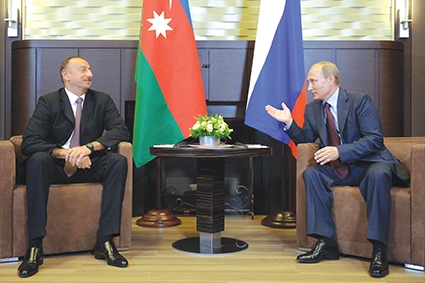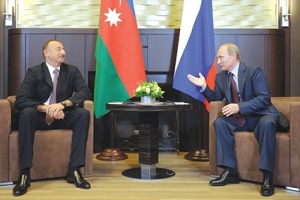Azerbaijan’s Relations with Russia: Beware the Bear
The geographic location of the three South Caucasian countries Armenia, Azerbaijan and Georgia is a curse. For centuries these countries have been divided and ruled by dominating Persian, Russian and Ottoman empires. The empires collapsed and faded away, but their successor states Iran, Turkey and the Soviet Union (present-day Russia) continue to dominate the region.
The collapse of the Soviet Union gave Azerbaijan breathing space to build a new independent state. Yet the curse of geography still lingers. An independent and sovereign state for 25 years, Azerbaijan is still bordered by Russia and Iran. And this time round, President Vladimir Putin will not give President IlhamAliyev’s regime a second chance to align with the West and Turkey.
First, it is important to elaborate on Azerbaijan’s current domestic situation and its implications for relations with Turkey, its strategic partner, as well as Azerbaijan’s relations with the EU and the US, because it explains why Azerbaijan eventually chose to co-operate with Russia. Over the past two to three years, Azerbaijan’s maneuvering space has shrunk due to the domestic economic downturn, falling oil and gas prices and subsequent depreciation of the local currency, and cooling relations with the EU and the US (hereafter called the West) and Turkey. In the end, Azerbaijan is left with the only viable option of co-operating with Iran and Russia, two countries that Azerbaijan has to be very careful with.
On the one hand, for the last 20 years, Azerbaijan has pursued a multilateral policy and kept Russia at a safe distance. Azerbaijan did not let Russia drag it into Russian-led organizations like the Collective Security Treaty Organization (CSTO) and the Eurasian Economic Union (EEU). Furthermore, Azerbaijan has strenuously objected to the deployment of Russian peacekeeping forces along the Line of Contact (LoC) in Nagorno-Karabakh. Azerbaijan learned from the experience of the international community that it has no leverage to make Moscow withdraw its troops, and international appeals to Russia to withdraw its troops from the occupied territories have fallen on deaf ears in Moscow.
Yet the government of Azerbaijan realized that in comparison with Russia, the West is weak and indecisive when it comes to the South Caucasus, and Turkey is preoccupied with domestic and foreign crises and distracted from Azerbaijan. As a result, Azerbaijan has to cope alone with its neighborhood, including Iran’s ambiguous policy. Although Azerbaijan and Turkey have been on the same page for many years towards Russia as Finlandization, akin to the Finnish pursuit of neutrality after the end of the Second World War in the face of a hostile Soviet Union.
Closer relations with Russia mean a radical shift in Azerbaijani strategic vision and foreign policy pursuit based on the past co-operation with the West and Turkey. There is no doubt that the shift has been accompanied by a strengthening of IlhamAliyev’s regime at home.
Eugene Kogan












